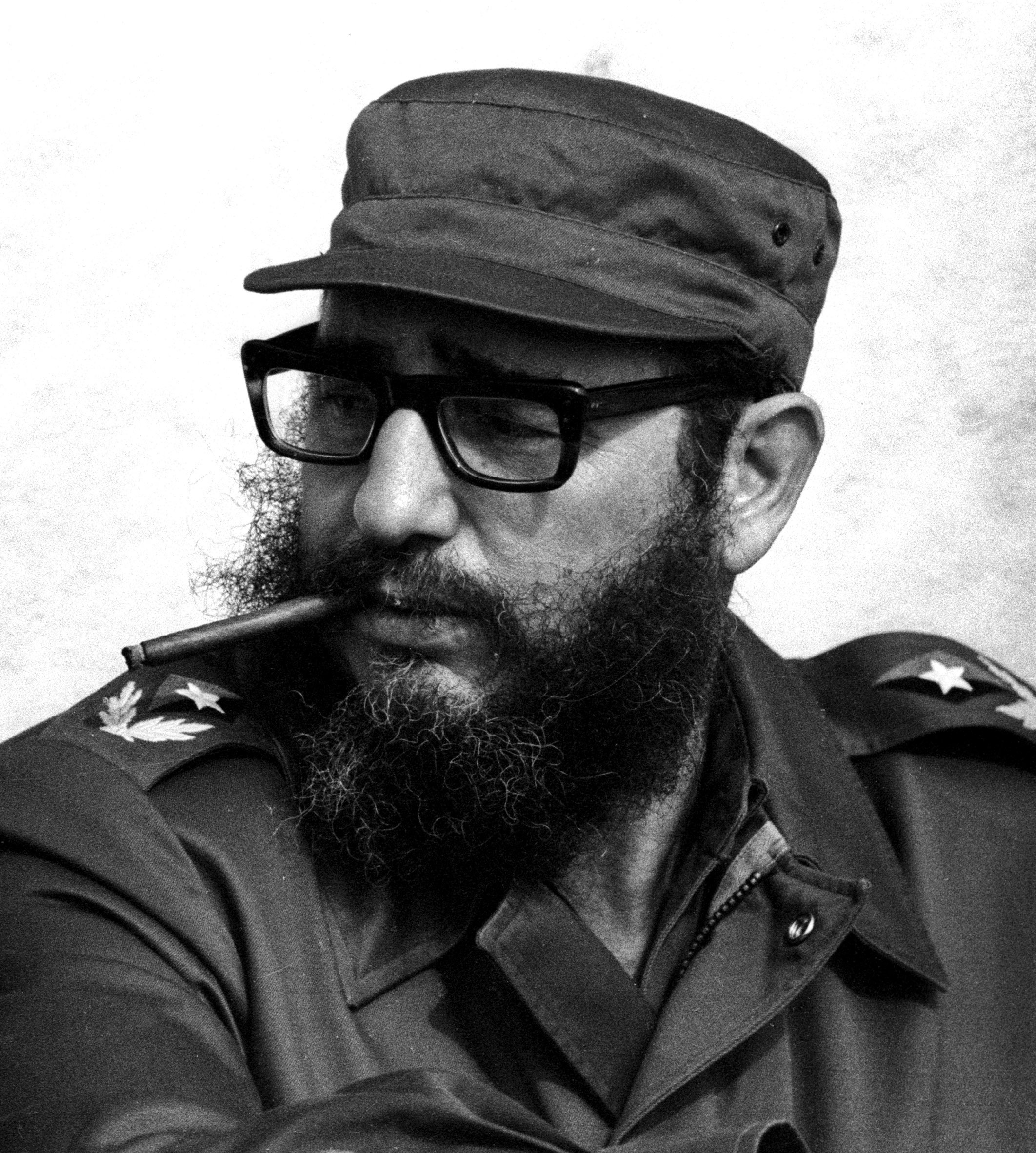More languages
More actions
El Comandante Fidel Castro | |
|---|---|
 Portrait of comrade Fidel | |
| Born | Fidel Hipólito Castro Ruz August 13, 1926 Birán, Cuba |
| Died | November 25, 2016 (aged 90) Havana, Cuba |
| Cause of death | Natural causes |
| Nationality | Cuban |
| Political orientation | Marxism–Leninism Anti-imperialism |
| Political party | Communist Party of Cuba |
Fidel Alejandro Castro Ruz (August 13th, 1926 — November 25th, 2016) was a Cuban Marxist–Leninist revolutionary and a leader of the Cuban Revolution, alongside Che Guevara, his brother Raúl, and others. He served as Prime Minister of Cuba from 1959 to 1976 and President from 1976 to 2008. He also served as the First Secretary of the Communist Party of Cuba from 1965 until 2011.
A sympathizer of the Cuban People's Party (Orthodox), he actively participated in the party's campaigns and was one of the first to denounce the reactionary and illegitimate nature of the de facto regime established after the coup d'état by Fulgencio Batista on March 10, 1952.[1]
He was imprisoned after the assaults on the Moncada barracks in Santiago de Cuba and the Carlos Manuel de Céspedes barracks in Bayamo, assuming his self-defense before the court that tried him, and pronouncing the plea known as "History Will Absolve Me", in which he outlined the program of the future Revolution in Cuba.[2]
Sentenced to 15 years in prison, he was amnestied in 1955 and went into exile in Mexico, from where he left with 81 other revolutionaries to disembark at Los Coyuelos on December 2, 1956. After several years of hard struggle, he entered victorious on January 1, 1959 in Santiago de Cuba and arrived in Havana on January 8.
On February 16, 1959, he was appointed Prime Minister of the Revolutionary Government. On December 2, 1976, he was elected President of the Councils of State and Ministers of the Republic of Cuba, a position he held until his resignation due to health problems on February 24, 2008.[3]
In 1992, Castro warned that climate change was an existential threat to the human species[4]
“An important biological species is at risk of disappearing due to the rapid and progressive liquidation of its natural living conditions: man”
Life
Early Life
Fidel Castro was born on August 13, 1926 in Birán in Oriente. His father was named Angel Castro Argíz and his mother was named Lina Ruz González. His father was a landowner.[5]
Castro initially attended a rural public school and later attended the schools of La Salle and Dolores in Santiago de Cuba. He then went to Dolores College and later the Jesuit Belén school. He graduated in June of 1945.[5]
In September of 1945 he enrolled in the University of Havana to study Law, Social Sciences and Diplomatic Law. He joined many student groups while attending. These included the the Pro Puerto Rican Independence Committee, the Pro Democracy in the Dominican Republic Committee, the September 30 Committee, and the University Student Federation.[5]
During 1947, Castro signed up to fight against the Dominican dictator Rafael Leónidas Trujillo. Those involved were caught by the Cuban Navy with Castro escaping capture by jumping into the water.[5]
After becoming introduced to Marxism, he traveled to Colombia, Panama, and Venezuela to start Latin American Student Congress. While in Bogotá, he became involved in the civil war.[5]
He graduated in 1950 with a PhD in Civil Law and a bachelor's degree in Diplomatic Law.[5]
Failed Assassination Attempts
The Cuban security services have documented after investigations over 600 attempts to murder Fidel Castro up until the year 2007.[6] These failed attempts by the CIA, directly or indirectly, had many methods. Some of the many attempts included: Snipers, explosives placed in his shoes, explosives inside a baseball, and poison injected into a cigar.[7]
Castro and his will regarding his memory
On December 27, 2016, the Law on the use of the name and figure of Fidel Castro Ruz in respect of his will, as expression of the political ethics that always accompanied him an expression of the humility and modesty that characterized him, and having always honored Marti's preaching that "all the glory of the world fits in a grain of corn", that his name will not be used to name institutions, squares, parks, avenues, streets and other public places, nor will monuments, busts, statues, commemorative plaques and other be erected in his memory.[8]
References
- ↑ La Historia me absolverá. F.Castro Ruz...[et.al.] -Ediciones Colihue SRL, 1993. -p156. ISBN 9505818041.
- ↑ Castro Ruz, Fidel. https://bnah.inah.gob.mx/bnah_lazaro_cardenas/uploads/E4_D124_FF1_18.pdf «La historia me absolverá» /Fidel Castro Ruz.
- ↑ «Proclama del Comandante en Jefe al pueblo de Cuba» http://www.cuba.cu/gobierno/discursos/2006/esp/f310706e.html
- ↑ "Fidel Castro Warned Us Of Climate Change" (2019-08-08). Qcostarica.
- ↑ 5.0 5.1 5.2 5.3 5.4 5.5 Granma (2019-11-01). "Fidel Castro Ruz" Granma. Retrieved 2023-07-09.
- ↑ Fabián Escalante (2016-07-25). "Objetivo: Fidel" Cuba Debate. Archived from the original on 2022-12-22. Retrieved 2023-03-06.
- ↑ "Fidel, la persona que más veces intentaron matar" (2011-12-15). Cuba Debate. Archived from the original on 2021-06-09. Retrieved 2023-03-06.
- ↑ Parliament approves a law on the use of the name and figure of Fidel Castro Ruz http://www.cubadebate.cu/noticias/2016/12/27/presentan-proyecto-de-ley-sobre-el-uso-del-nombre-y-la-figura-del-companero-fidel-castro-ruz/#.WGPAXScffEw
